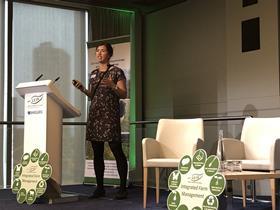
The Ellen MacArthur Foundation has called for UK farmers and growers to be financially incentivised for the environmental goods they provide in a post-Brexit agricultural policy.
The organisation, headed by the world record-breaking English sailor, works with business, government and academia to build a framework fora circular economy.
Speaking at the LEAF Annual Conference in London, the project lead for the charity’s food initiative, Emma Chow, said there should “absolutely” be systems in place to properly compensate farmers for the environmental measures they take.
“We’ve been investigating this a lot and looking at some examples around the world where farmers are starting to be compensated for the [environmental] value of their production methods, beyond just the food that they’re providing.
“I think we need to look at incentive systems and structures in a broad sense – it’s not just about valuing food products and the nutrition contained, but also farmers’ care and stewardship for the land, air and water.”
Her comments came in response to a plea from rapeseed grower and LEAF Demonstration farmer Duncan Farrington, who has done significant work in sequestering carbon by planting trees.
“We’ve been sequestering 8.9 tonnes of carbon every hectare every year over the last 16 years,” he said. “That’s fantastic for publicity, great on my LEAF audit and it looks wonderful, but as someone said earlier, a standing tree is valueless, whereas if you cut it down it has value.
“The publicity’s lovely but we want to be financially rewarded. That would be a brilliant start to achieving a circular economy.”
This was the theme of the conference, which explored the benefits and challenges associated with pushing for a circular food system.
There were presentations and panel debates involving a range of speakers, including the Food Foundation’s Anna Taylor and the Tim Benton of the Royal Institute of International Affairs, around driving more productive and sustainable farming systems. According to LEAF, these can lead to cost savings, waste prevention, job creation and economic and social opportunities.
Building a circular economy, with a focus on designing out waste from the system, was a strong focus of this year’s World Economic Forum in Davos.



